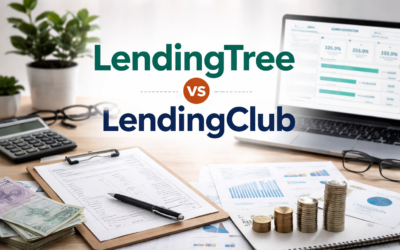Upgrade Vs Upstart
Both Upgrade and Upstart offer unsecured personal loans with flexible terms, fast funding, and transparent pricing. However, each company caters to a slightly different demographic.
Upgrade is well-suited for those looking for credit card alternatives, flexible repayment options, and debt consolidation tools. Upstart, on the other hand, is ideal for people with limited credit history or non-traditional financial backgrounds who need fast funding.
How does Upgrade compare to Upstart?
| Upgrade | Upstart | |
| Personal loan available amounts | $1,000 to $50,000 | $1,000 to $50,000 |
| Personal loan term length range | 24 to 84 months | 36 or 60 months |
| Credit cards available? | Yes | No |
| Debt consolidation available? | Yes | Yes |
| BBB grade | A+ | A+ |
Upgrade Vs Upstart – Key Differences
While both companies provide competitive personal loans, Upgrade and Upstart differ in how they evaluate applicants, the types of financial tools they offer, and their approaches to credit and repayments.
Upgrade leans heavily into borrower and repayment flexibility, offering multiple repayment terms, a helpful mobile app, and credit card options that can serve as alternatives to revolving-debt credit cards. It’s also a strong choice for those with fair credit who want fixed-rate personal loans and debt consolidation tools with direct payments to creditors.
Upstart, by contrast, focuses more on accessibility for those with thin or unconventional credit profiles. Instead of relying solely on credit scores, Upstart uses artificial intelligence and over 1,000 data points, including education and employment, to evaluate creditworthiness. This allows many applicants to qualify for a personal loan even if their credit score is low or nonexistent. However, Upstart’s limited loan term options may not suit every borrower’s needs.
Which Is Better, Upgrade or Upstart?
If your credit score is 580 or above and you want the option to include a co-borrower, choose Upgrade. You’ll get flexible repayment terms, the ability to send loan funds directly to creditors, and even access to fixed-rate credit cards that act like structured personal loans.
However, if your credit score is lower or you have a thin credit file, Upstart could be the better option. The company’s AI model gives more weight to employment and education factors, and you could be approved in cases where you may not otherwise qualify.
Both companies offer unsecured loans, soft credit checks during prequalification, and no prepayment penalties, making them solid choices depending on your needs.
Related Article: Upgrade Credit Card Reviews: Which One Is Right for You?









